For lovers of barbells and dumbbells, stretching might be at the bottom of your list of priorities when you’re crushing a good workout. A sweet pump and rewarding burn may well take center stage — less glamorous stretches often take a back seat. But when it comes to keeping your muscles in top form, stretching definitely deserves a more prominent spot in your training.
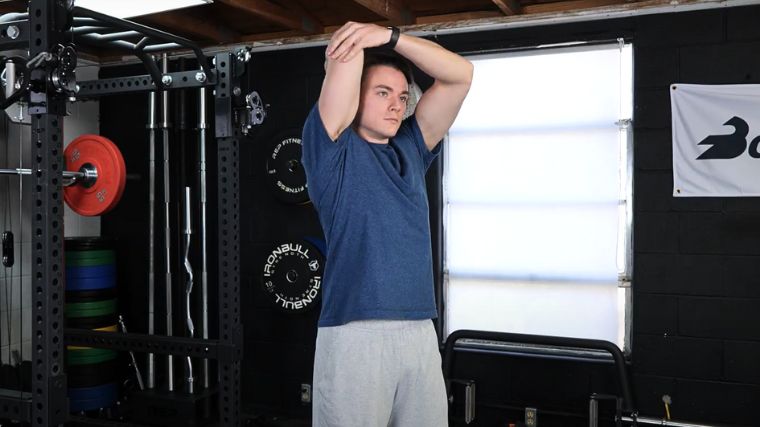
Whether you’re overhead pressing or bench pressing, you’ll be contracting your triceps hard as you lock out the lift. Stretching is the flip side of that contraction, and you’ll want to get more stretch time in when it’s time to use every aspect of your training — including recovery — to maximize your numbers. Here, we’ve put together the five best triceps stretches to get you the best of both strength and flexibility.
Editor’s Note: The content on BarBend is meant to be informative in nature, but it should not be taken as medical advice. When starting a new training regimen and/or diet, it is always a good idea to consult with a trusted medical professional. We are not a medical resource. The opinions and articles on this site are not intended for use as diagnosis, prevention, and/or treatment of health problems. They are not substitutes for consulting a qualified medical professional.
The 5 Best Triceps Stretches
The triceps brachii are a three-headed muscle group found on the back side of your upper arm. It primarily performs elbow extension but also plays a role in shoulder extension as well. Here are five stretches to best hit your triceps from every angle.
- Cross-Body Triceps Stretch
- Overhead Triceps Stretch
- Assisted Overhead Triceps Stretch (Towel Stretch)
- Single-Arm Cable Cross-Body Triceps Extension
- Single-Arm Overhead Cable Triceps Extension
1. Cross-Body Triceps Stretch
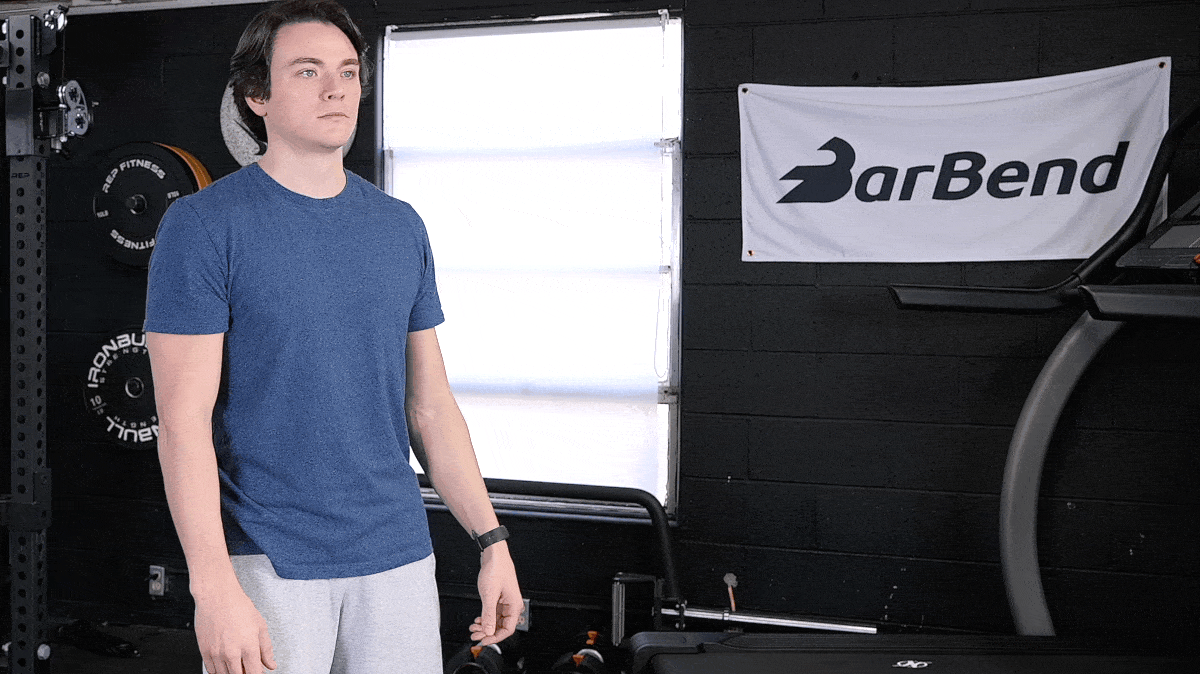
[Read More: The Best Arm Exercises to Add to Your Workout Routine]
The cross-body triceps stretch is a classic, nearly instinctive stretch for many people. It is a simple but effective addition to any warm-up or cooldown for your upper body exercises. As stretching exercises go, it doesn’t require much time, effort, or skill to weave into your routine.
How to Do the Cross-Body Triceps Stretch
- Stand with your feet shoulder-width apart with a tall but relaxed posture.
- Take your right arm and extend it straight ahead of your body with your palm facing down.
- Using your left hand, help draw your right arm across your body without rotating your thoracic spine.
- Continue to draw your right arm across your body until you feel a light stretch across the back of your arm.
Modifications
- Make it Easier: Experiment with where you grab onto your working arm with your free hand in order to accommodate larger chests and shoulders. Aim to move in a way that enables a stretch across the back of your upper arm.
- Make it Harder: Actively press into your free hand with your working arm. This will activate your triceps muscle and start incorporating upper body strength into an otherwise fairly passive stretch.
Coach’s Tip: Try the cross-body triceps stretch with both a flexed or extended elbow for slightly different sensations. Also, try it with your palm facing down or facing your body.
2. Overhead Triceps Stretch
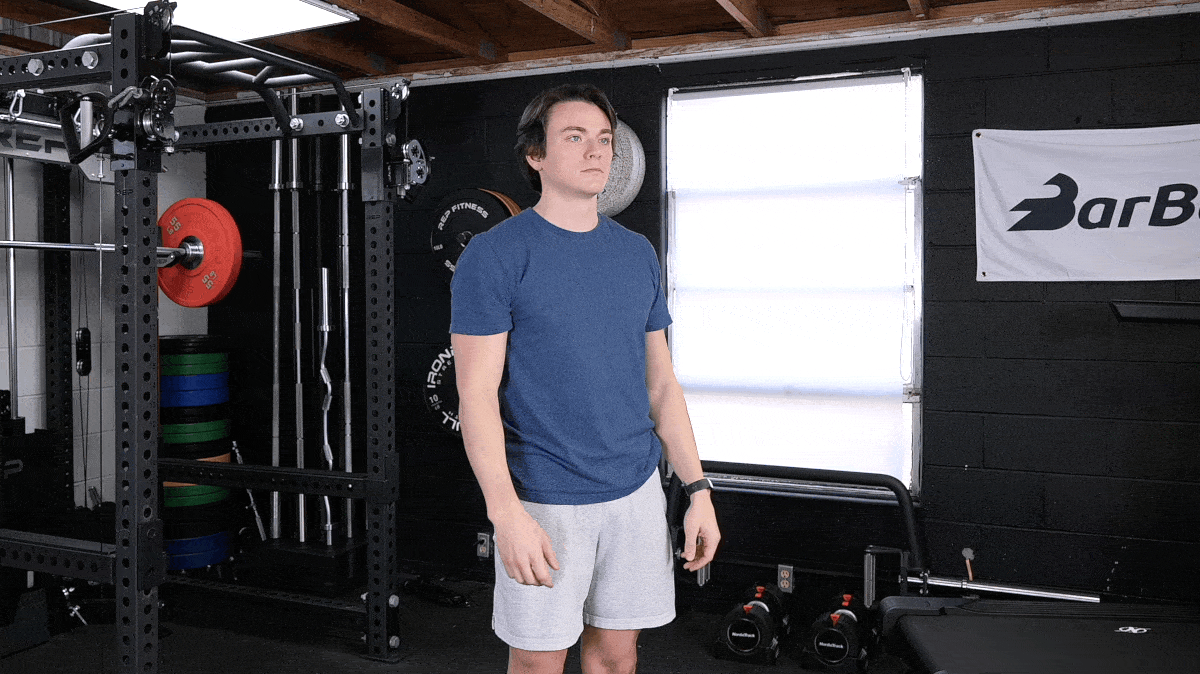
The triceps are located on the back of your upper arm and mainly work to extend your elbow. But one of the three heads of the triceps actually crosses the shoulder as well. The long head of triceps therefore benefits from your arm getting overhead, like during the overhead triceps stretch.
How to Do the Overhead Triceps Stretch
- Stand with a tall posture and your feet shoulder-width apart.
- Raise your left arm above your head with your hand facing forward.
- Bend the elbow of the raised arm so that the hand slides behind your back. Your elbow should still be facing the ceiling.
- With your right hand, pull your left elbow towards your head to feel a light stretch on the triceps. Repeat on both sides.
Modifications
- Make it Easier: If you struggle with overhead mobility in your workout program, try using a wall to assist with the overhead triceps stretch. Instead of getting completely overhead, choose an arm height that works for your mobility and lean it against the wall for a stretch.
- Make it Harder: Perform this while holding a PVC pipe in both hands, pressing the backs of your elbows against a plyo box or wall. Press your upper arms into the surface to increase the intensity of the stretch.
Coach’s Tip: As much as possible, avoid flaring out your rib cage during this stretch. Focus on your current range of motion, rather than artificially producing a deeper range by putting your torso in jeopardy.
3. Assisted Overhead Triceps Stretch (Towel Stretch)
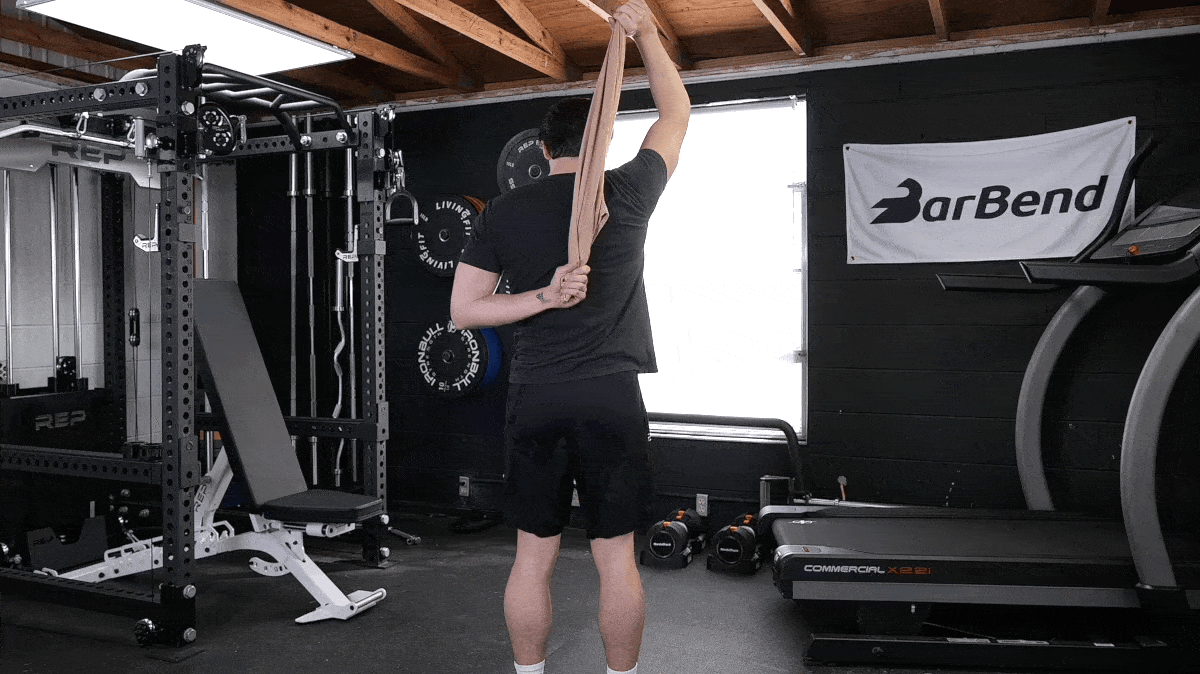
[Read More: The Best Bodybuilding Arm Workout, Customized to Your Experience Level]
It might be difficult to hit the regular overhead triceps stretch. Whether you’re just starting to work on your mobility or you’re lacking range of motion because your arms are simply too huge, the assisted overhead triceps stretch (or towel stretch) is a lifesaver.
How to Do the Assisted Overhead Triceps Stretch (Towel Stretch)
- Stand with a tall posture and your feet shoulder-width apart.
- Hold a towel in both hands with your arms extended straight ahead of your body and your palms facing down.
- Raise your arms above your head. From here, choose one arm to stretch and use the opposite side to lightly pull down on the towel.
- Allow the stretching side to bend the elbow and be drawn into a stretch.
Modifications
- Make it Easier: Use a lighter resistance band or a lightly-gripped towel to use minimal resistance.
- Make it Harder: To increase the stretch, use a heavier resistance band or intensify your grip on the towel.
Coach’s Tip: A band is a great alternative to use if you do not have a towel handy.
4. Single-Arm Cable Cross-Body Triceps Extension
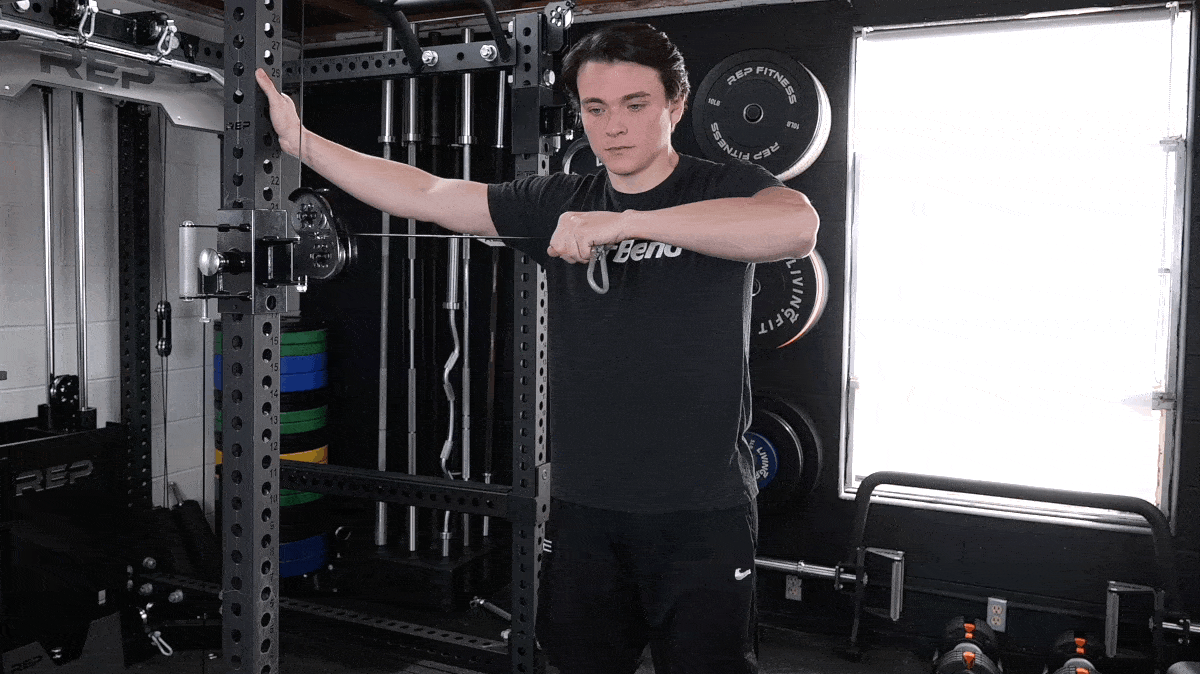
Structured stretching is not the only time that you’re able to help mobilize your muscles. Properly performed resistance exercise with eccentric control and full range of motion is a fantastic way to get a double dose of gains. The muscle is working for growth but also taking advantage of the load and positioning to encourage increased mobility.
How to Do the Single-Arm Cable Cross-Body Triceps Extension
- Adjust the height of a cable stack machine such that the pulley sits around armpit height.
- Using a single triceps rope attachment, grab the implement and face away from the machine so your hand is making a fist and facing down.
- Take a subtle step forward so the cable stack is not resting on the plates.
- Brace and extend your elbow against the resistance of the cable stack. Aim for as much elbow flexion on each repetition as possible.
Modifications
- Make it Easier: Use a dual rope attachment and perform this as a triceps pushdown with both hands. You won’t get as big of a stretch between each rep, but you’ll still build mobility with less of a balance challenge.
- Make it Harder: With each rep, pause at both the top and bottom of your range of motion.
Coach’s Tip: For even more triceps stretch, take advantage of reciprocal inhibition for a greater benefit to your mobility. Think of contracting your biceps when you are at the bottom of each rep.
5. Single-Arm Overhead Cable Triceps Extension
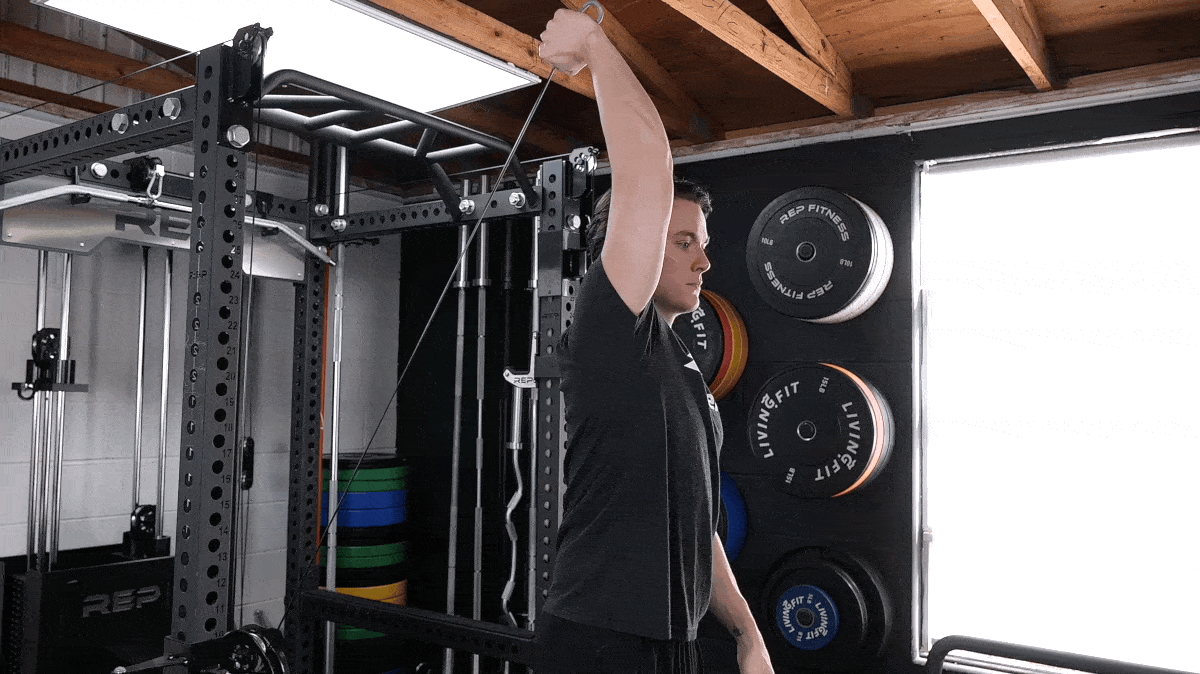
[Read More: New Study Suggests Overhead Triceps Extensions Build More Muscle Than Pushdowns]
Stretching your triceps and growing your triceps go hand-in-hand using the single-arm overhead cable triceps extension. The overhead position helps to target the long head of the triceps and stretching the triceps is almost guaranteed because of the position of your upper arm. Be sure to use a controlled full range of motion for the best results.
How to Do the Single-Arm Overhead Cable Triceps Extension
- Adjust the height of a cable machine such that the pulley sits at the bottom position.
- Using a single rope attachment, grab the implement and raise it above your head. Fully lock out your shoulder and elbow.
- Adjust your position to be standing side-by-side with the cable stack, your working arm should be on the side of your body furthest from the machine.
- Slowly lower your hand behind your head similar to the overhead triceps stretch technique. Contract your biceps in the bottom for a brief second before extending your elbow back to the starting position.
Modifications
- Make it Easier: Set the pulley a little higher up than the bottom position so that the cable won’t be quite as intensely taut at the end range of motion.
- Make it Harder: Slightly increase the weight and pause briefly at the end of your range of motion with each rep to really lean into the stretch.
Coach’s Tip: Choose a weight that you’re able to stabilize. Loaded exercises in the overhead position may be tricky so start light and work up.
Why You Should Stretch Your Triceps
Stretching your triceps is a fantastic part of any wellness routine. From temporarily relieving tension or perceived soreness to improving your range of motion, stretching your triceps has a ton of potential carryover benefits to your lifts.
Many of the best triceps exercises place your upper arm in overhead or unstable positions. This helps to mobilize and stabilize your upper back, shoulder blades, and even your latissimus dorsi (or lats). Stretching also requires negligible increases to your equipment or time commitments to training — so it won’t feel like you’re piling on too much.
[Read More: Build Bigger, Stronger Arms with These 9 Triceps Extension Variations]
Whether you add triceps stretches to your dynamic warm-up, cooldown, or within the workout itself, many of your best choices are extremely accessible. Most triceps stretches are performed with just your body weight and can be simply woven into your exercise selection in the weight room.
What the Science Says About Stretching
Stretching has started to get a lot more attention within the research space. Improving flexibility is usually the area of interest here, but more recently there have been whispers that stretching may be beneficial for muscle growth as well.
For Muscle Growth
Maximizing muscle growth is the goal for a significant portion of lifters, so tinkering with newer techniques or methods with the promise of more gains is always welcome. Loaded stretching (1) or performing exercises in a more stretched muscle position has started to receive greater research focus due to some interesting data. (2)
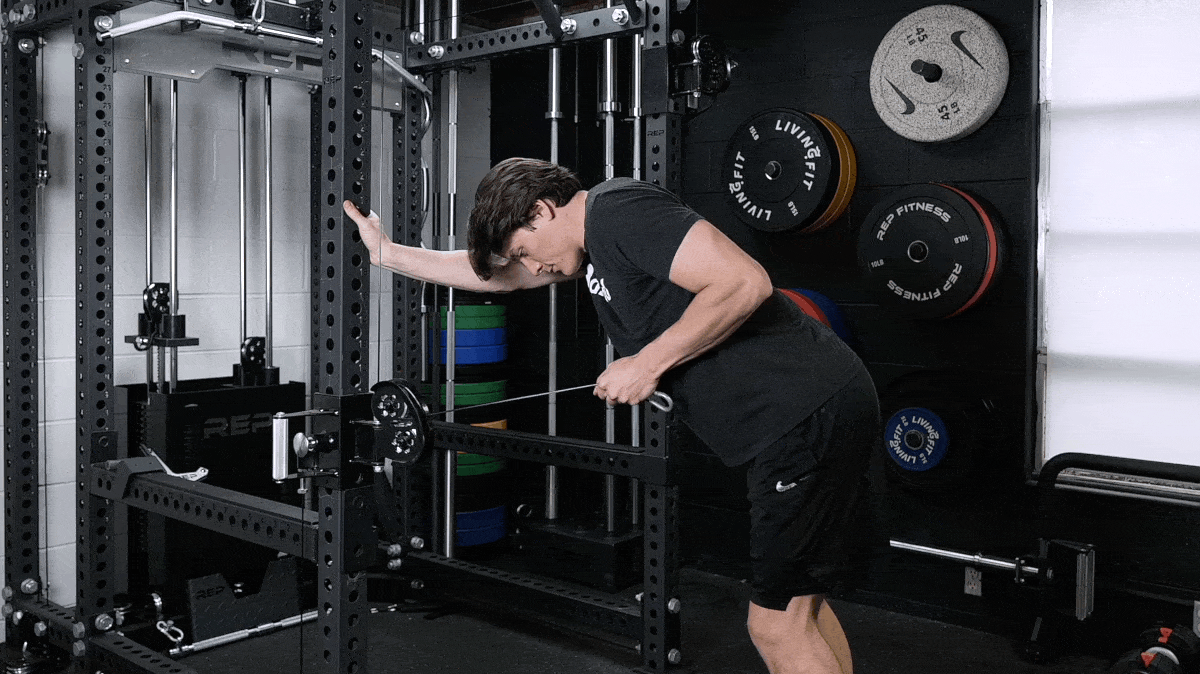
[Read More: Try These 6 Unique Bodybuilding Arm Exercises to Spark New Muscle Growth]
Some studies seem to suggest potential benefits for muscle gain from performing exercise in a more lengthened muscle position, such as an overhead triceps extension. (3) Although promising, much more research needs to be performed across many muscle groups and exercise positions to fully flesh out any benefits for muscle growth compared to other positions.
For Flexibility
Flexibility is one of the most common rationales for using stretching in any program. Many forms of stretching (static stretching, dynamic, or proprioceptive neuromuscular facilitation or PNF stretching) have been shown to improve the range of motion in the short term immediately after their completion. (4)
Aside from the immediate range of motion improvements, chronic stretching (particularly static stretches) has also been shown to be beneficial for improving muscle range of motion at the calf. (5)
[Read More: 14 Triceps Exercises to Improve Your Bench Press and Overhead Strength]
Given the relatively low effort and time investment required, static stretching appears to be a viable option for improving both immediate and long-term flexibility.
When to (and Not to) Stretch
Stretching is an extremely time-and-location-friendly tool for your repertoire. You’re able to stretch essentially anywhere — from downtime watching your favorite show to loaded stretching during your training sessions themselves, with or without a personal trainer.
There has been some concern about static stretching in particular and its supposed negative impact on performance if completed immediately before strength training. While early studies suggested that long-duration static stretches may reduce performance (6), this information was seemingly misinterpreted.
[Read More: 8 Great Triceps Exercises You’re Probably Not Doing]
A good amount of research since then has helped to clarify this topic. Generally, shorter duration stretches shouldn’t hurt training performance when performed immediately before exercise. (7) So yes, you may be able to do some of these stretches before blasting out those push-ups.
Stretch Those Arms
Arm stretches aren’t always top of mind for the iron-obsessed gym rat, even if arm muscles are. But stretching is an easy way to warm up, improve range of motion and blood flow, and even potentially increase muscle gain.
As a good rule of thumb, perform all exercises with a full range of motion and pepper in some longer muscle-length exercises every once in a while for good measure. From bodyweight static stretching to loaded stretching performed within your workout – it’s easy to capitalize on some often-forgotten gains.
FAQs
Triceps stretches are a great way to improve mobility and overall training session performances, these are some frequently asked questions that you may have.
As long as you don’t suspect that your soreness is from an injury, you can stretch out sore triceps to help alleviate any lingering tightness. It’s important to know that your muscles are undergoing recovery, however, so keep your stretches light and shorter in duration to allow them the time they need to heal and repair.
If you’re uncertain about where to begin, consider consulting a physical therapist or other qualified healthcare provider.
The best way to relieve sore triceps is to help promote muscle recovery. The biggest thing you can do is eat adequate calories (and particularly protein) to help with the tissue-rebuilding process. Combine good nutrition with excellent sleep and you should be well on your way.
Tight triceps are often caused by muscle stiffness after a hard workout or from not performing exercises through a full range of motion. The triceps are responsible for extending your elbow, so wherever possible perform exercises that flex and extend your elbow as fully as safely possible.
Triceps stretching can certainly improve arm flexibility over time. Between static stretches performed as a warm-up or cooldown to the longer range of motion exercises woven into your program, triceps stretches can be a huge asset for arm flexibility.
References
- Nunes, J. P., Schoenfeld, B. J., Nakamura, M., Ribeiro, A. S., Cunha, P. M., & Cyrino, E. S. (2020). Does stretch training induce muscle hypertrophy in humans? A review of the literature. Clinical physiology and functional imaging, 40(3), 148–156.
- Wolf, M., Androulakis-Korakakis, P., Fisher, J., Schoenfeld, B., & Steele, J. (2022). Partial vs full range of motion resistance training: A systematic review and meta- analysis.
- Maeo, S., Wu, Y., Huang, M., Sakurai, H., Kusagawa, Y., Sugiyama, T., Kanehisa, H., & Isaka, T. (2023). Triceps brachii hypertrophy is substantially greater after elbow extension training performed in the overhead versus neutral arm position. European journal of sport science, 23(7), 1240–1250.
- Behm, D. G., Blazevich, A. J., Kay, A. D., & McHugh, M. (2016). Acute effects of muscle stretching on physical performance, range of motion, and injury incidence in healthy active individuals: a systematic review. Applied physiology, nutrition, and metabolism = Physiologie appliquee, nutrition et metabolisme, 41(1), 1–11.
- Medeiros, D. M., & Martini, T. F. (2018). Chronic effect of different types of stretching on ankle dorsiflexion range of motion: Systematic review and meta-analysis. Foot (Edinburgh, Scotland), 34, 28–35.
- Ogura, Y., Miyahara, Y., Naito, H., Katamoto, S., & Aoki, J. (2007). Duration of static stretching influences muscle force production in hamstring muscles. Journal of strength and conditioning research, 21(3), 788–792.
- Kay, A. D., & Blazevich, A. J. (2012). Effect of acute static stretch on maximal muscle performance: a systematic review. Medicine and science in sports and exercise, 44(1), 154–164.
The post The 5 Best Triceps Stretches to Push Your Presses to the Next Level appeared first on BarBend.

